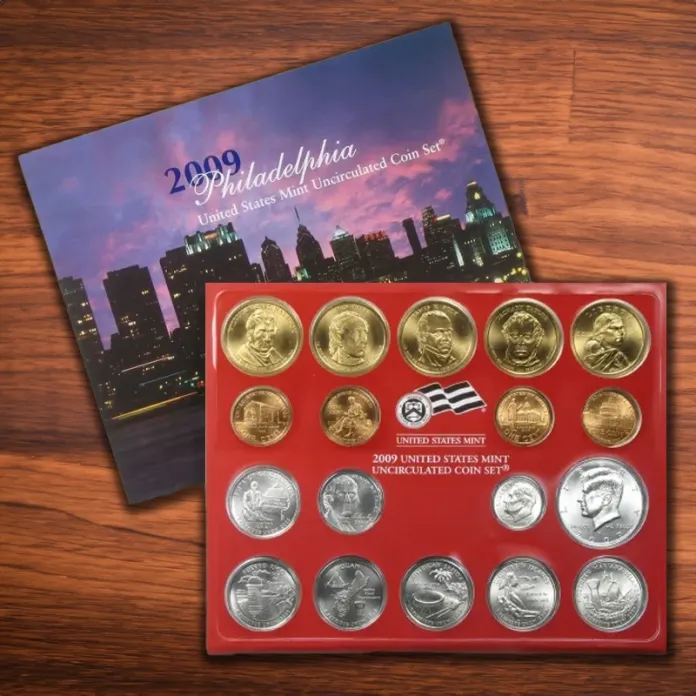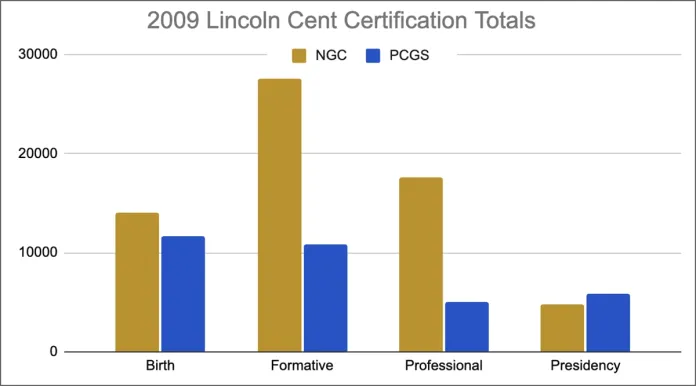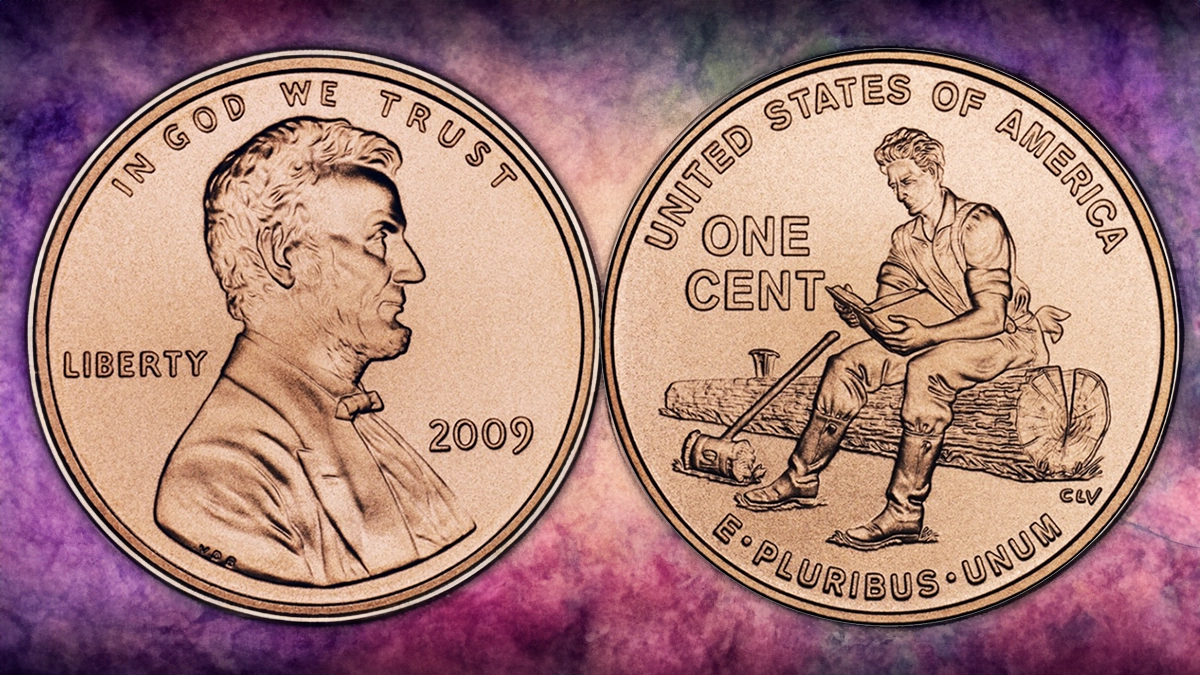
By Charles Morgan and Hubert Walker for CoinWeek Notes …..
The 2009 Lincoln Formative Years Cent is the second of the four circulating commemorative Lincoln Bicentennial Cent designs that the United States Mint issued to commemorate the 200th anniversary of President Abraham Lincoln’s birth. The theme for the first coin in the series was Lincoln’s birth and early childhood living in a simple log cabin in Kentucky. For the second coin, the Mint issued a design that spoke to Lincoln’s years as a young man pursuing his education while supporting his family as a rail splitter.
Abraham Lincoln in Indiana
After trying his hand at farming in Kentucky, Abraham Lincoln’s father, Thomas Lincoln, Sr., moved the family to an undeveloped wooded area in Perry County, Indiana in 1816. The future President was just seven years old at the time, and his father, eager to rebuild his family’s finances after losing everything in title disputes in Kentucky, returned to farming. Life on the frontier remained hard, but the laws governing the newly admitted state of Indiana were more favorable to landowners. With the help of his son’s labor and intellect, Thomas Lincoln was eventually able to establish an 80-acre homestead with a clear title.
The family’s poor finances kept young Lincoln toiling on the farm instead of attending school on a regularly. His stepmother Sarah Bush Johnston, although uneducated herself, saw in Lincoln a love for learning and reading and encouraged him to pursue his education, which he did intermittently. Thomas Lincoln, with his eyesight failing, sold his land and moved the family to Macon County, Illinois in 1830. At the time, Abraham Lincoln was 21 years old.
The 2009 Lincoln Formative Years Cent is Released
The coin launch ceremony for the 2009 Lincoln Formative Years Cent was held on May 14 at the 1,500-seat Lincoln Amphitheater in Lincoln State Park in Lincoln City, Indiana. Despite inclement weather, a large crowd gathered earlier in the day to mark the release of the second Bicentennial Cent. A Brinks truck filled with one million rolled cents delivered the coins on behalf of Freedom National Bank. Attendees waited in line for hours to purchase between two and six rolls of the new coin.
Despite warnings from state officials against profiteering on state grounds during the exchange, many people sold their allotment of cents to coin dealer representatives of SilverTowne, Chattanooga Coin Co., and others. Coin World writer Paul Gilkes reported in the June 1, 2009 issue, that SilverTowne was paying $10 per roll, while Chattanooga had mailed promotional material to local residents offering $5 per roll.

The promoters landed at least a few hundred rolls for their efforts as NGC and PCGS report a combined population of First Day of Issue coins at 19,076. The most common NGC grade for the first day release was MS66RD; for PCGS, the most common grade was MS65RD.
Copper Versions for Collectors

While the Mint discontinued the use of bronze planchets to strike cents in 1982, for the release of the 2009 cents, the U.S. Mint offered collectors a commemorative striking of the coins in the vintage bronze format. The appearance of the regular circulation strike coins and the collector versions is slightly different but is easily differentiated by weight. Zinc cents weigh 2.5 grams, while the copper-alloy version weighs 3.11 grams.
Collectors could also acquire examples of the 2009 cent by purchasing the 2009 Uncirculated Coin Set, which contained one of each coin design struck for circulation in 2009, including the Washington, D.C., and Territorial Quarters, four Presidential Dollars, and the inaugural release of the Native American Dollar program. Sets carried an issue price of $27.95 ($41.64 in 2024 inflation-adjusted dollars) and generally sell today for about $30.
If certified, these specially prepared coins should grade higher than their corresponding circulation-strike versions. NGC and PCGS have certified just under 1,000 examples at SP/MS69. These coins sell for about $100.
Multiple Doubled Dies

Eagle-eyed collectors have identified more than 100 doubled die varieties of the 2009 Lincoln Formative Years Cent. Most are minor and require close examination under high magnification. Some, however, are quite distinct and show clear doubling of Lincoln’s fingers. PCGS recognizes the eight Doubled Die Reverse varieties listed in the Cherrypicker’s Guide.
Submissions = Enthusiasm

As discussed in our section on the coin’s launch, enthusiasm for the 2009 Lincoln Formative Year Cents was high. Looking at the submission data, we see that interest in the four-coin program peaked with this release. The latter two designs saw diminished demand, especially at PCGS. By the release of the fourth design, much of the incentive for marketers to submit the coin in bulk was gone. We interpret this to mean that the certified coins did not perform well upon release.
How Much Are 2009 Lincoln Formative Years Cents Worth Today?
Today’s 2009 Lincoln Formative Years Cent value runs from 1¢ for an ordinary cent pulled out of circulation to potentially $500 or more for pristine examples, unmarred by flaws, stains, or wear. The typical circulated example, however, is graded MS66RD and sells for about $10 or less.
2009 Lincoln Formative Years Cents were saved in uncirculated condition in sufficient numbers. Even on a limited budget, anybody interested can acquire a bright red uncirculated example raw for less than $1 per coin on websites like eBay. Original United States Mint 50-coin rolls sell for about $10 each.
For the foreseeable future, the cost of encapsulation will limit the number of coins submitted to CAC, NGC, or PCGS for grading. Most of the examples in NGC and PCGS holders were submitted during the coin’s immediate launch window, as this was when profit potential for bulk submitters was at its highest. Because of this, the certified populations do not reflect the true scarcity of the issue, and one should not read anything into the current top-pop census data as these numbers could easily multiply by a hundred-fold or more if the profit incentive existed.
* * *
Market Data and Noteworthy Specimens
2009 Lincoln Cent, Formative Years – Zinc Circulation Strike
Top Population: PCGS MS68RD (3, 11/2024), NGC MS68RD (33, 11/2024), and CAC N/A (0:0 stickered:graded, 11/2024).
- NGC MS66RD #3295880-306: eBay, November 19, 2024 – $12.95. First Day of Issue.
- NGC MS66RD #3294324-466: eBay, November 18, 2024 – $9.89. First Day of Issue.
- NGC MS66RD #3294453-426: eBay, November 17, 2024 – $3.25. First Day of Issue.
- NGC MS66RD #3294983-148: eBay, November 9, 2024 – $4.00 First Day of Issue.
- PCGS MR66RD #48157206: eBay, November 3, 2024 – $7.99.
- PCGS MS66RD #48156204: eBay, November 3, 2024 – $7.99.
- NGC MS66RD #4336430-002: eBay, October 28, 2024 – $65. DDR, FS-802.
- Two Original Mint Sealed Rolls: eBay, November 20, 2024 – $8.99.
2009 Lincoln Cent, Formative Years – Copper Mint Set Version
Top Population: PCGS SP69RD (262, 11/2024), NGC MS69RD (243, 11/2024), and CAC N/A (0:0 stickered:graded, 11/2024).
- Philadelphia Mint Set (includes all P-Mint Coins): eBay, November 22, 2024 – $18.95.
* * *
Design
Obverse:
The obverse of the 2009 Lincoln Cent was designed by Victor David Brenner and appears largely as it did when the type was first minted in 1909. The main difference between the modern obverse versus the 1909 version is the location of Brenner’s initials, V.D.B., which were added under Lincoln’s bust in 1918 after their removal from the reverse in late 1909. The year 2009 appears to the right of Lincoln. The motto IN GOD WE TRUST appears above the president, and behind him (viewer’s left) is the word LIBERTY.
Reverse:
A youthful Abraham Lincoln, dressed for manual labor outdoors, is sitting on a log and reading. Before to his break, he was hard at work splitting the tree trunk with a mallet and wedge (both of which are seen to his right) to make rails for train tracks. Wrapping clockwise around the top of the design is the legend UNITED STATES OF AMERICA and above the wedge and mallet filling up most of the field is the denomination ONE CENT in two lines. The motto E ∙ PLURIBUS ∙ UNUM runs counterclockwise along the bottom of the coin. Former Sculptor-Engraver Charles L. Vickers designed the reverse; his initials CLV are at the bottom of the log on the right.
Edge:
The edge of the 2009 Lincoln Cent is plain or smooth.
2009 Lincoln Bicentennial Cent – Formative Years Specifications
| Country: | United States of America |
| Year of Issue: | 2009 |
| Denomination: | One Cent (USD) |
| Mintmark: | None (Philadelphia) |
| Mintage: | 376,000,000 circulation strikes in copper-played zinc, 784,614 in Satin Finish for Uncirculated Coin Sets |
| Alloy: | .992 zinc and .008 copper, plated with pure copper (Zinc); .950 copper, .050 tin and zinc (Copper) |
| Weight: | 2.50 g (Zinc); 3.11 g (Copper) |
| Diameter: | 19.05 mm |
| Edge: | Plain |
| OBV Designer: | Victor David Brenner |
| REV Designer: | Charles L. Vickers |
| Quality: | Business Strike |
* * *


